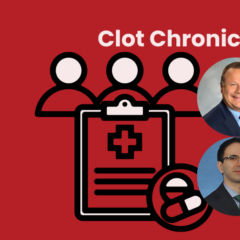Last updated on
Is Atrial Fibrillation Connected to Dementia?
Updated December 2019
By Umberto Campia, MD, MS
Atrial fibrillation (Afib) is an abnormal heart rhythm (arrhythmia) that causes an irregular and, at times, very fast heartbeat. Afib is the most common type of arrhythmia and affects several million people in the U.S. The risk of developing Afib increases with age, and the risk doubles with each decade of life after the age of 40. Afib may cause palpitations (the feeling of an abnormal heartbeat), but often patients are not aware of it. While palpitations may be bothersome, the main health consequences of Afib are due to other issues. First, the risk of a persistently elevated heart rate can weaken the heart and cause heart failure. Second, blood clots can form in the left upper chamber of the heart. These clots can dislodge and travel through the circulatory system, where they can cause strokes and heart attacks, or block the blood flow to the limbs and abdominal organs (such as the spleen, kidneys, and gut).
Interestingly, recent studies have shown that patients with Afib have an increased risk of dementia, a term that refers to debilitating conditions caused by the progressive deterioration of cognitive functions and capabilities necessary for independent living. Similar to AFib, the risk of developing Alzheimer’s disease and other forms of dementia increases with age and in the presence of hypertension, diabetes mellitus, and smoking. It’s well known that Afib can cause strokes and in about 20% of all patients with dementia, strokes are the main culprit. However, there’s growing evidence that the presence of Afib increases the risk of dementia above and beyond what would be expected by the presence of the other conditions and strokes. There’s currently great interest in a possible causal role of Afib in dementia, and several lines of research are actively being pursued.
Potential Mechanisms Linking Atrial Fibrillation and Dementia
Dementia in its various forms is the consequence of progressive damage to the brain from abnormal loss of neurons and other brain cells. Several mechanisms have been postulated to explain the loss of neurons, including:
Cerebral hypoperfusion: The term cerebral hypoperfusion refers to a state of significantly reduced blood flow to the brain, which is not severe enough to cause immediate cell death but leads to insufficient delivery of oxygen and nutrients to maintain normal cell function. The chronic exposure to even very short, but frequent, episodes of hypoperfusion leads to brain cell malfunction and eventually death. It’s been postulated that the irregular cardiac rhythm present in Afib may cause beat-to-beat variability in blood flow to the brain, with a certain proportion of the beats associated with hypoperfusion. In addition, Afib may lead to a chronic reduction of brain blood flow due to its effects on the pumping function of the heart. These mechanisms have been suggested by a number of experimental studies. However, human investigations in this area are difficult to conduct and definitive proof is still lacking.
Vascular inflammation: Population studies indicate that the presence of elevated blood levels of certain inflammatory proteins, such as C-reactive protein (CRP) and interleukin-6 (IL-6), are associated with a 3-fold increase of developing dementia. This evidence suggests that inflammation may participate in the mechanisms of brain cell damage and loss that leads to dementia. Interestingly, the same inflammatory markers have been associated with an increased risk of developing Afib. The presence of Afib may lead to increased levels of CRP and IL-6 and can lead to a self-perpetuating inflammatory state, which increases the risk of dementia. However, further study is necessary to clarify the role of Afib in the inflammatory theory of dementia.
Cerebral small vessel disease: While symptomatic stroke is a widely recognized risk of Afib, the occurrence of “silent” brain damage, which is reported in up to 80% of patients with Afib, is less well appreciated. The mechanisms underlying this form of brain pathology are not completely understood, but small strokes in the deep areas of the brain and damage to small brain vessels with small areas of hemorrhage (microbleeds) are likely significant contributors. Importantly, this type of brain damage may explain why Afib may lead to dementia, even in the absence of strokes.
Brain atrophy: A population study where participants underwent brain MRIs suggests that Afib may lead to a loss of brain volume. In particular, the presence of Afib was associated with lower volumes of total brain and gray and white matter (the two main types of brain tissues). Furthermore, participants with persistent Afib had lower volumes than those with intermittent episodes of Afib. Consistent with a duration of exposure-effect relationship, the longer the time a person had been in Afib, the more brain tissue they had lost. As the association between Afib and loss of brain volume could not be fully explained by the presence of other conditions or previous strokes, additional mechanisms are likely at play. These observations are compatible with the hypothesis that patients with long-standing Afib have less cerebral perfusion than those with only intermittent Afib. However, confirmatory evidence is still lacking.
Does treatment of atrial fibrillation reduce the risk of dementia?
If the hypothesis that Afib contributes to the onset of dementia is true, effective treatment of Afib should reduce its occurrence. To date, no studies have been specifically designed to test this hypothesis. However, an observational study has shown that Afib patients who underwent radiofrequency ablation therapy, which currently is the most effective way to restore the normal rhythm in Afib, had significantly lower risk for dementia than patients who did not have an ablation. Future study is warranted to understand the impact of rhythm restoration by catheter ablation or pharmacological approach on the risk of dementia in Afib patients.
Conclusions
Afib and dementia are common diseases associated with aging. They share common risk factors, and recent evidence indicates that Afib itself may increase the risk of dementia. Research studies conducted to date have shed some light on the links between Afib and dementia. However, definitive proof of this link is still missing and the mechanisms remain elusive. Given the impact of dementia on quality of life and the societal costs associated with this condition, there is an unmet need for further study in this field.
Umberto Campia, MD, MS is a vascular medicine specialist at Brigham and Women’s Hospital.




